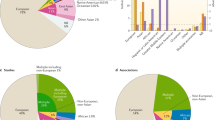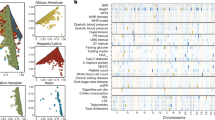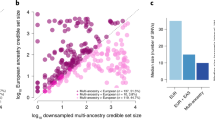Abstract
'Racial' differences are frequently debated in clinical, epidemiological and molecular research and beyond1,2. In particular, there is considerable controversy regarding the existence and importance of 'racial' differences in genetic effects for complex diseases3,4,5,6 influenced by a large number of genes7. An important question is whether ancestry influences the impact of each gene variant on the disease risk. Here, we addressed this question by examining the genetic effects for 43 validated gene-disease associations across 697 study populations of various descents. The frequencies of the genetic marker of interest in the control populations often (58%) showed large heterogeneity (statistical variability) between 'races'. Conversely, we saw large heterogeneity in the genetic effects (odds ratios) between 'races' in only 14% of cases. Genetic markers for proposed gene-disease associations vary in frequency across populations, but their biological impact on the risk for common diseases may usually be consistent across traditional 'racial' boundaries.
This is a preview of subscription content, access via your institution
Access options
Subscribe to this journal
Receive 12 print issues and online access
$209.00 per year
only $17.42 per issue
Buy this article
- Purchase on Springer Link
- Instant access to full article PDF
Prices may be subject to local taxes which are calculated during checkout



Similar content being viewed by others
References
Cooper, R.S., Kaufman, J.S. & Ward, R. Race and genomics. N. Engl. J. Med. 348, 1166–1170 (2003).
Burchard, E.G. et al. The importance of race and ethnic background in biomedical research and clinical practice. N. Engl. J. Med. 348, 1170–1175 (2003).
The International HapMap Consortium. The International HapMap Project. Nature 426, 789–796 (2003).
Thomas, D.C. & Witte, J.S. Point: population stratification: a problem for case-control studies of candidate-gene associations? Cancer Epidemiol. Biomarkers Prev. 11, 505–512 (2002).
Kaufman, J.S. & Cooper, R.S. Commentary: considerations for use of racial/ethnic classification in etiologic research. Am. J. Epidemiol. 154, 291–298 (2001).
Wacholder, S., Rothman, N. & Caporaso, N. Counterpoint: bias from population stratification is not a major threat to the validity of conclusions from epidemiological studies of common polymorphisms and cancer. Cancer Epidemiol. Biomarkers Prev. 11, 513–520 (2002).
Lander, E.S. & Schork, N.J. Genetic dissection of complex traits. Science 265, 2037–2048 (1994).
Rosenberg, N.A. et al. Genetic structure of human populations. Science 298, 2381–2385 (2002).
King, M.C. & Motulsky, A.G. Human genetics. Mapping human history. Science 298, 2342–2343 (2002).
Feldman, M.W., Lewontin, R.C. & King, M.C. Race: a genetic melting-pot. Nature 424, 374 (2003).
Risch, N., Burchard, E., Ziv, E. & Tang, H. Categorization of humans in biomedical research: genes, race and disease. Genome Biol. 3, 2007 (2002).
Kressin, N.R., Chang, B.H., Hendricks, A. & Kazis, L.E. Agreement between administrative data and patients' self-reports of race/ethnicity. Am. J. Public Health 93, 1734–1739 (2003).
Ioannidis, J.P., Ntzani, E.E., Trikalinos, T.A. & Contopoulos-Ioannidis, D.G. Replication validity of genetic association studies. Nat. Genet. 29, 306–309 (2001).
Ioannidis, J.P., Trikalinos, T.A., Ntzani, E.E. & Contopoulos-Ioannidis, D.G. Genetic associations in large versus small studies: an empirical assessment. Lancet 361, 567–571 (2003).
Pettiti, D. Meta-analysis, Decision Analysis and Cost-Effectiveness Analysis (Oxford University Press, New York, 1999).
Higgins, J.P. & Thompson, S.G. Quantifying heterogeneity in a meta-analysis. Stat. Med. 21, 1539–1558 (2002).
Collins, F.S. The case for a US prospective cohort study of genes and environment. Nature 429, 475–477 (2004).
Lichtenstein, P. et al. Environmental and heritable factors in the causation of cancer–analyses of cohorts of twins from Sweden, Denmark, and Finland. N. Engl. J. Med. 343, 78–85 (2000).
Doll, R. & Peto, R. The causes of cancer: quantitative estimates of avoidable risks of cancer in the United States today. J. Natl. Cancer Inst. 66, 1191–1308 (1981).
Cardon, L.R. & Bell, J.I. Association study designs for complex diseases. Nat. Rev. Genet. 2, 91–99 (2001).
Acknowledgements
J.P.A.I. generated the idea for this project and wrote the protocol that was further elaborated by the other two authors. E.E.N. carried out additional data extraction with help from T.A.T. These two authors carried out the statistical analyses with contribution from J.P.A.I. All authors interpreted the data and the analyses. The final draft was written by J.P.A.I. and commented on critically by the other two authors. We thank D. Contopoulos-Ioannidis for her scientific contribution to important background work for this project and A. Wu, S. Glatt, M. Preisig, A. Lalovic, R. Inzelberg and L. Le Marchand for providing additional data on their published meta-analyses. The project was supported by a PENED grant from the General Secretariat for Research and Technology, Greece and the European Commission.
Author information
Authors and Affiliations
Corresponding author
Ethics declarations
Competing interests
The authors declare no competing financial interests.
Supplementary information
Supplementary Fig. 1
Control frequencies and effect sizes for overall-validated marker-disease associations. (PDF 46 kb)
Supplementary Table 1
Included and excluded meta-analyses of gene-diseases associations. (PDF 23 kb)
Supplementary Table 2
Within-race and between-race variance for control frequencies. (PDF 3 kb)
Supplementary Table 3
Pair-wise comparisons for control frequencies. (PDF 5 kb)
Supplementary Table 4
Within-race and between-race variance for odds ratios. (PDF 5 kb)
Supplementary Table 5
Pair-wise comparisons for odds ratios. (PDF 4 kb)
Rights and permissions
About this article
Cite this article
Ioannidis, J., Ntzani, E. & Trikalinos, T. 'Racial' differences in genetic effects for complex diseases. Nat Genet 36, 1312–1318 (2004). https://doi.org/10.1038/ng1474
Received:
Accepted:
Published:
Issue Date:
DOI: https://doi.org/10.1038/ng1474
This article is cited by
-
Identifying QTLs involved in hybrid performance and heterotic group complementarity: new GWAS models applied to factorial and admixed diallel maize hybrid panels
Theoretical and Applied Genetics (2023)
-
A systematic review and meta-analysis on the association between CD36 rs1761667 polymorphism and cardiometabolic risk factors in adults
Scientific Reports (2022)
-
The rs9340799 polymorphism of the estrogen receptor alpha (ESR1) gene and its association with breast cancer susceptibility
Scientific Reports (2021)
-
Pilot GWAS of caries in African-Americans shows genetic heterogeneity
BMC Oral Health (2019)
-
Genetic predisposition to lung cancer: comprehensive literature integration, meta-analysis, and multiple evidence assessment of candidate-gene association studies
Scientific Reports (2017)



